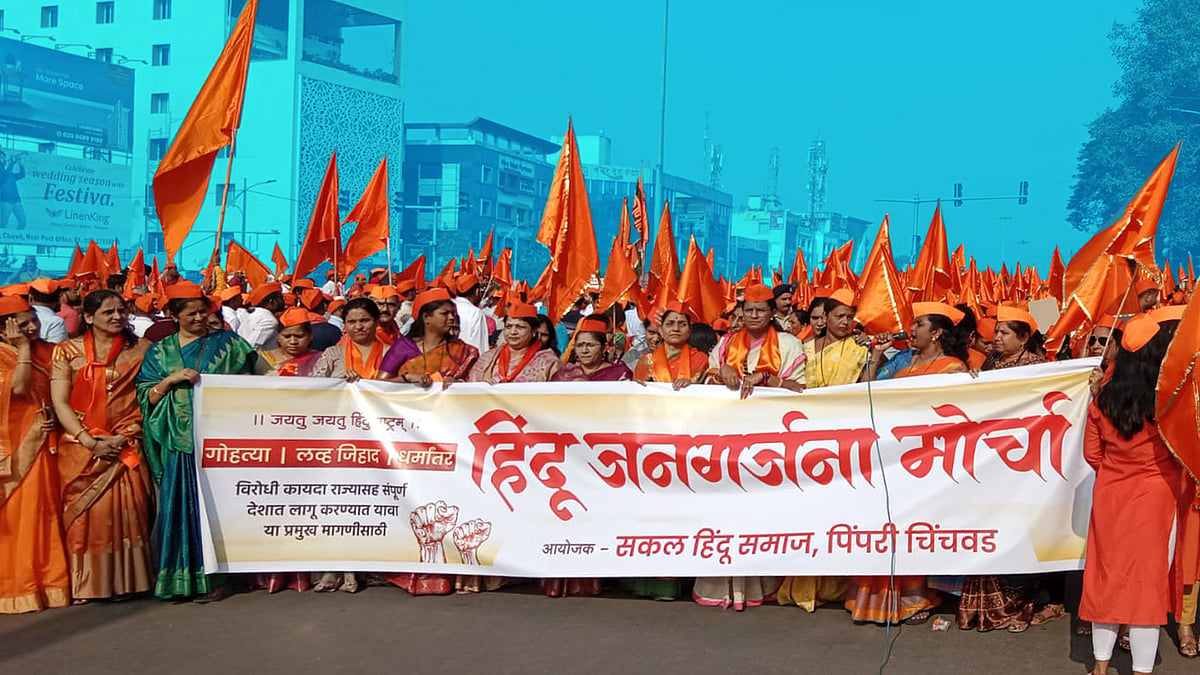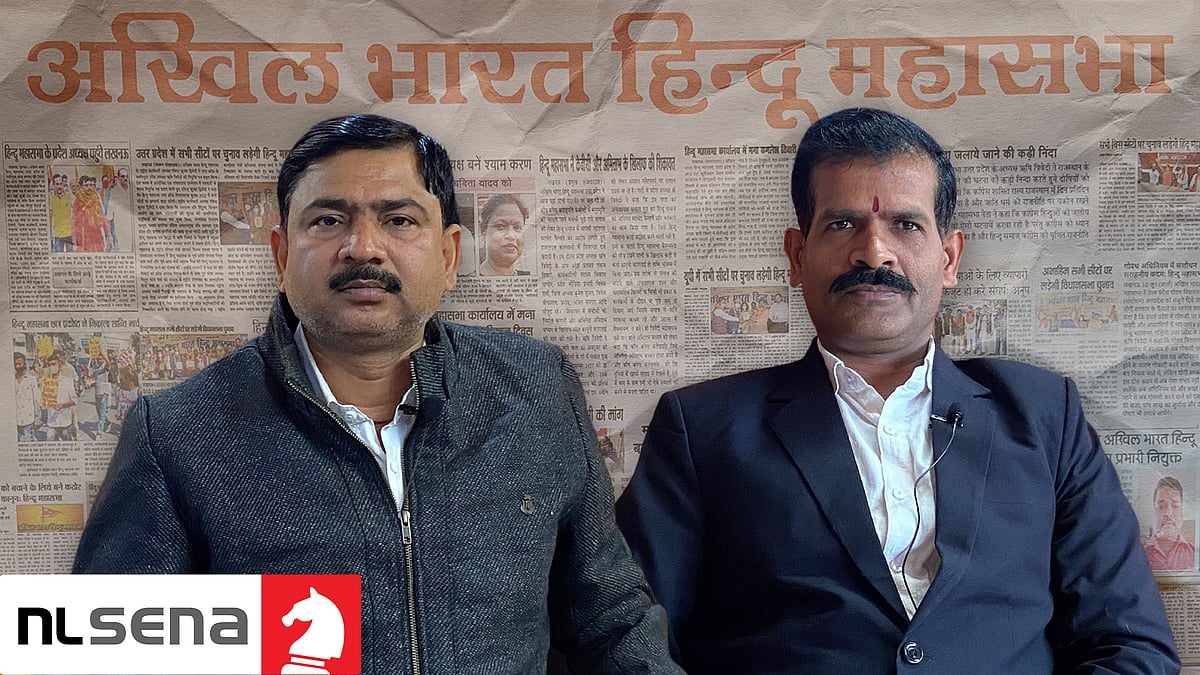In sickness and in safety: A safe house in Satara provides refuge to interfaith couples
They’re given advice, shelter and protection from their families. In some cases, their weddings are organised at the safe house.
After Ketan and Nasrin got married on March 20, 2022, they were plunged into stress.
The wedding was a simple affair – a registration with two friends as witnesses at Alandi near Pune. They rented a home in Hinjewadi to start their lives together. But this idyllic period couldn’t last. Once the wedding ceremony was done, the couple fell to the task of informing their parents back home that they’d tied the knot.
Ketan and Nasrin are from the same village in Satara. Theyt fell in love while studying in Pune. They made sure to establish their careers before informing their parents in the village that they wanted to get married.
“My father was against the decision. He told me our family will face problems if I have an interreligious marriage,” said Ketan. “I also tried to convince Nasrin’s father but he was not ready to listen.”
Things came to a head when Nasrin’s father asked her to return from Pune since a “boy was coming” to see her. “I realised my father had decided to marry me off,” she told Newslaundry. “Ketan and I were already making plans for marriage but this triggered us.”
The couple quietly left for Alandi and had their ceremony. Their new rented home had security guards and CCTV cameras but they were frightened of being targeted.
“We were very tense,” said Ketan. “Even a simple stare from an unknown person on the road was enough to scare us. We always felt someone would catch us, assault us, even though our house had good security. There was constant fear of being attacked in our minds. We even went to the police station to file a non-cognisable complaint but the police told us to go underground until the situation gets normal.”
Scared and vulnerable, Ketan and Nasrin reached out to a social activist named Shankar Kanse, who runs a safe house in a village in Satara. The house is exclusively for couples who marry after breaking traditional notions of religion, caste and class. Kanse’s NGO Snehadhar has worked with the Maharashtra Andhashraddha Nirmulan Samiti, or ANiS, founded by late rationalist Narendra Dabholkar, for the last seven years. Four years ago, they decided to provide shelter and safety to couples who have nowhere else to go – and who fear backlash from relatives or the community.
For Nasrin and Ketan, the safe house was a godsend. They stayed there for eight days.
“Shankar sir took care of us. Not for a moment did we feel like we were living in a safe house – it was just like home,” said Ketan. “Shankar sir spoke to us at length about our future and explained that despite getting married, we could still be pressured by family members to get separated. We could be threatened or emotionally blackmailed. He told us to be ready and prepared for it.”
The advice came in handy. Days later, the couple received a phone call from a police station – both sets of parents had arrived with a mediator. The couple went to the police station but it was a difficult interaction.
“Ketan’s family agreed but my family was not ready to budge,” said Nasrin, who also goes by the name Kavya. “Many of my relatives came along and were insisting I return with them. But I told the police I had married Ketan and I was going to stay with him. The police took my statement and asked my family not to pressure me or else they would be on the wrong side of the law.”
Now settled in Pune, the couple said they owe Kanse a debt of gratitude.
“If that safe house hadn’t been there to provide us with immediate protection and guidance, I don’t know what would have happened to us,” Nasrin said. “During such times, couples are very vulnerable. I wish there were more safe houses to protect married couples who get killed or separated just because of caste or religion.”
Arranging weddings, providing advice
These fears are real. In India, official data indicates that 18 people were murdered in India in 2022 in ‘honour killings’, but these statistics are widely believed to be grossly underestimated. In 2018, the Supreme Court laid down guidelines to “meet the challenges of the agonising effect of honour crime”. One of the guidelines was the establishment of a safe house in every district headquarter.
Compliance is low, however. Maharashtra, for instance, only has Kanse’s safe house.
Kanse told Newslaundry that’s why he started it. It operates “in secrecy”, he said, and asked this reporter not to publish details on where the safe house is located.
“The entire idea to open a safe house was to stop honour killings,” he said. “The first 15 to 20 days after marriage are very crucial for interfaith or inter-caste couples. Most attacks and killings happen during this period. We provide protection to couples who want to get married and save them from all kinds of atrocities by their family or community members.”
Kanse said the building was initially a “simple structure” but “we made it a proper home”.
“We informed ANiS volunteers to spread the message about it so couples can be helped and provided protection,” he said. “Many times, we arranged the marriage of couples at the safe house. Fifteen couples have come here since we began.”
Among them are Aishwarya and Tushar Bandivdekar, who stayed at the safe house in 2020. Originally from Yellapur village in Satara, they fell in love when Aishwarya was in Class 12 and Tushar in his final year of college.
“After a courtship period of five years, we decided to get married. We were in love and wanted to spend our lives together,” Aishwarya said. “I told my parents and they refused. They started forcing me to marry someone else. The bone of contention was caste and financial disparity. There was too much pressure.”
Aishwarya and Tushar decided to get married as soon as possible. “But we didn’t have any support at that time. We didn’t know how to proceed further,” she said. “Fortunately, a friend told us about Shankar sir’s safe house. And things gradually started falling into place.”
The couple first spoke to Kanse on the phone and then left their village to meet him at the safe house.
“He first interviewed us together and then separately,” Aishwarya told Newslaundry. “He wanted to be sure of our intentions to marry, whether we were ready for it or not. After verifying everything, he got us married at the safe house the very next day.”
Aishwarya and Tushar stayed at the safe house for 10 days.
“I have a joint family and I was worried my family members would attack us,” she said. “I was worried they’d catch us and forcefully get me married to some other person. My family filed a police complaint at Kokrud police station in Sangli and our phones were tracked. On the tenth day, the police came to the safe house and took us to the local police station. Our families were present there.”
Aishwarya remembers her relatives being “aggressive” and “forceful”. “They were insisting I come with them. I refused. ANiS members gave us security and we returned to the safe house,” she said. “We stayed for two days and then left for Sangli, where we started our new lives.”
Aishwarya added that her family were “good people” who were “influenced by societal pressure”.
“People instigate them to attack or kill their own sons and daughters,” she said. “My family is powerful. If they had caught us in a hotel or somewhere else, something wrong may have happened. Nobody knows what people can do because of ego and anger. We used to be in fear all the time. But since we were in the safe house, they couldn’t do anything. We need more such places so killings and crimes can be prevented.”
‘It was just like home’
Hamid Dabolkar of ANiS told Newslaundry that society today is “marred by problems of caste and religious extremism”.
“At present, the political weaponisation of caste and religion is at its peak,” he said. “In such times, if an inter-caste or interfaith couple wants to marry, they face a lot of difficulties for shelter, food, money...Sometimes, their lives are also at risk. This safe house is an initiative to help and protect such people. I am hopeful the government will open more such safe houses everywhere.”
Shubham Lohar, a 28-year-old environment, health and safety officer, told Newslaundry he used Kanse’s safe house to marry his girlfriend Pooja. The two of them lived on the same road in Kolhapur.
“We didn’t have a caste or religion problem. But her family fixed her marriage to someone else,” Shubham said. “We were in shock. We didn’t have any idea how we’d stop her marriage. Then a friend who used to live in Shankar sir’s village informed me about his safe house.”
The friend assured Shubham that “things will be taken care of”. The couple was desperate – they had no money or resources – so they set off.
“It was just like home,” Shubham said. “We spent four days there and got married. Sir assured us nothing would happen to us and we could stay as long as we wanted. He explained the consequences to us and told us how to deal with the situation.”
After their wedding, Shubham went to Kurundwad police station in Kolhapur and informed the police of the nuptials. “The police called our families and told them we were legally wed out of our own will and that they shouldn’t trouble us. The families were a little angry. After a few months, things settled down and all of us are now on very good terms. The safe house helped us unite. Otherwise, things would have taken a different turn.”
With more people learning about the building’s existence, Kanse told Newslaundry the safe house will be named “Savitri-Jyoti Nirwara Kendra” after Savitribai and Jyoti Phule. “I suggest that the government open at least one safe house in every district because this will definitely help in curbing cases of attacks on couples and honour killings,” he added.
Small teams can do great things. All it takes is a subscription. Subscribe now and power Newslaundry’s work.
General elections are around the corner, and Newslaundry and The News Minute have ambitious plans. Click here to support us.
 ‘A burning issue’: How the Sangh family is spearheading protests in Maharashtra for a love jihad law
‘A burning issue’: How the Sangh family is spearheading protests in Maharashtra for a love jihad law ‘We saved a girl’s honour’: How Hindu Mahasabha stopped an interfaith marriage in Lucknow
‘We saved a girl’s honour’: How Hindu Mahasabha stopped an interfaith marriage in Lucknow
